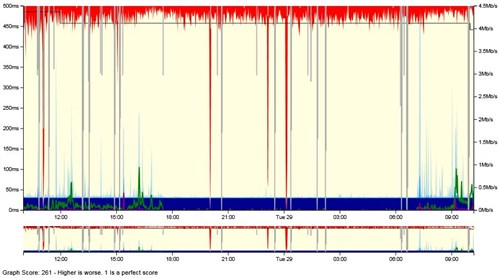Packet Loss
Packet Loss
Packet Loss How to see it, when is it normal and when is it not. Helpfully, BT don't easily accept packet loss as an issue.
Packet loss occurs when network traffic is sent down a link and for a number of reasons does not get to the far end.
This can be for a number reasons,
- there may be more traffic than a router can handle 
-
- its CPU is running flat out and it cannot cope
- it may have more traffic to send than will fit down the interface
- the link itself may be faulty and loosing or corrupting data as it is transmitted.
 
Packet loss is Normal when a link is oversububscribed - it is what happens and web protocols 'slow down' to allow the traffic to fit.
So for example a company which is performing a backup to an off-site location will often max the upload on their link and this will affect other use of the link.
When there is packet loss, different applications are affected differently (becuse they use different protocols which behave differently)   Voice and video both use UDP protocols which leads to sound becoming choppy and video breaking up or freezing. 
Web pages and downloads use TCP protocols which slow down and back off to fit the avaialble bandwidth. 
This means that even low levels of random packet loss can massively slow down a data transfers.  As such a fast FTTC can be brought to 1 or 2 Megabits or an ADSL made unusable.
 Packet loss on a quiet link is a fault.  Though sometimes getting BT wholesale and other providers to admit there is an issue can be an uphill interaction.  We constantly monitor all our broadband lines for packet loss.  If you look at the image below, the red coming down from the top represents the packet loss and is present when data is not flowing.
 

Graphs like this are available on your myIC portal to show the actual performance of your link.

